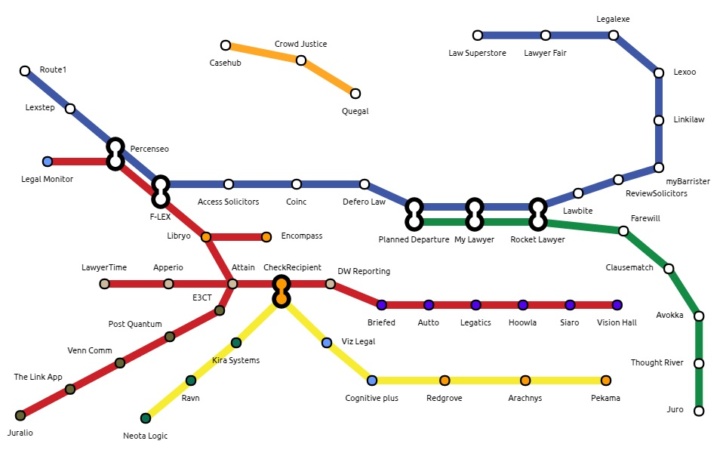There are no longer any good excuses. If legal practitioners are looking for greater understanding of what’s going on at the cutting edge of legal technology, or better yet, want to participate by creating or adopting new technologies for the law, there is no shortage of places to go to feed that interest.
The technology-driven changes in the legal industry have spawned a fascinating network of organisations devoted to legal innovation in all its various forms:
Start-up incubators and innovation centres
LegalX in Toronto is part of a larger centre for innovation called MaRS; Evolve Law is a membership-based organisation that brings together entrepreneurs and those interested in innovation, with a series of lively, topical events and services such as a legal tech job board. Last week I spoke at Legal Geek’s Conference, part of their series of events centered on legal tech entrepreneurship. Together we produced this map of London’s legal tech startup scene.
Academic centres
These cover a wide range of territory. CodeX at Stanford links Stanford’s Law School with its computer science department, and along the way has become a global centre for legal innovation and legal tech start-ups. LegalRnD at Michigan State University is a centre for cross-disciplinary training that brings design, engineering and other disciplines into legal education. In Germany, Bucerius Law School is home to Bucerius Law Port which, like CodeX, brings together academics, practitioners and entrepreneurs focused on digital technologies. And the new Law Lab at Chicago-Kent College of Law, opening this fall, will be led by Professor Daniel Martin Katz, a recognised leader in computational law and the application of data science to the law.
Open legal data centres
The Legal Information Institute in the US was one of the first global open data centres, but it has since been joined by institutes around the world, including very active organisations in places like Australia, Canada and Hong Kong. They all have free law databases at their core, but also serve as centres for research and advocacy around open data issues.
Meet-up groups
The various regional Legal Tech Meetup groups and regional chapters of the Legal Hackers groups are one of the more recent and popular manifestations of legal tech communities. These are informal groups that meet with varying frequency around topics of interest. They have bottom-up agendas driven by the interests of members.
Behind each of these communities are dozens of people from different backgrounds: academics, start-up CEOs, researchers, activists, law students, computer scientists, law firm and in-house lawyers, design professionals, and various types of industry advocates and gadflies.
And each of the organisations has its own focus: legal education, open data, artificial intelligence, legal start-ups, access to justice, small law, Big Law. Some want to save the legal industry, some want to blow it up. Some are global in scope, some are fiercely local. It’s all here.
They do different things. They put on big conferences and short hackathons. They publish reports, research and white papers. They train a new generation of tech-savvy lawyers. They build stuff. They tear stuff down. They argue, cajole and convince. They carry on the dialogue of an industry in transition.
A number of characteristics make many of these communities accessible to interested practitioners:
Community, collaboration and fun
Newer legal tech events aren’t like industry trade shows, where buyers and sellers meet to do business at arm’s length in traditional They are much more likely to be centered around themes and ideas, and typically include a wide range of participants, including entrepreneurs, funders, law firm lawyers, in-house GCs, technologists, open data enthusiasts and law students. And to be blunt about it, they are more fun than typical legal industry events, with more networking, more unpolished presentations, more workshop-like activities rather than just talking-head presentations. Many are held in funkier locations with beer, wine and socialising as a central part of the attraction.
Globalisation
Legal tech aficionados around the world are dealing with many of the same issues, despite very real differences in legal systems and cultures worldwide. Where the law itself can be jurisdiction-specific and parochial, legal tech is attractively global in nature.
A new relationship to the profession
Does legal tech present a threat, or an opportunity for partnership to the existing legal industry? In its early years, much of this legal tech movement was focused on being a threat to the legal status quo, as innovators naturally sought the attention and drama inherent in the classic start-up story line of industry disruption. It wasn’t unusual for established industry organizations and law firms to dismiss the threats as too apocalyptic and negative. Now, however, you’ll find more traditional law firms looking for ways to integrate these new ways of thinking. Think Dentons’ creation of NextLaw Labs as a side initiative to incubate new ideas, or firms like Littler, Akerman, Perkins Coie and Baker Donelson, who are building their own client-facing, software-based solutions. Not everyone is on board, but fewer establishment players are dismissive of the changes that tech is bringing to the legal industry.
The interesting thing about this landscape of communities is that many of these groups did not exist five years ago. If you are looking for substantive innovation in the industry, it can sometimes be frustrating to see the lack of progress in terms of technology adoption and legal services delivery innovations. But the good news is that thousands of like-minded people are banging away at the problem – and most won’t be going away soon.
If you or your innovation-minded colleagues are not actively participating in some of these forums, you’re missing out on a good glimpse at the future of the legal profession.

